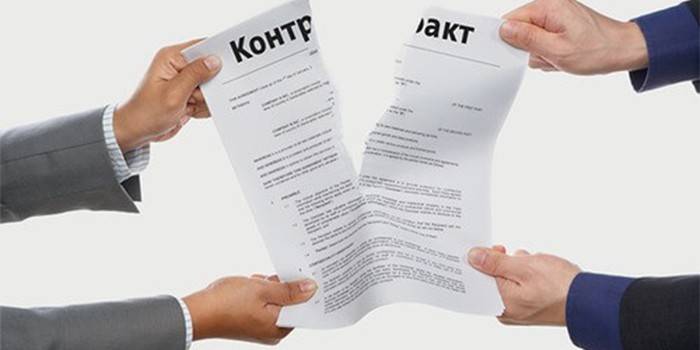Grounds for signing a fixed-term employment contract - when concluded, the duration and obligations of the parties
In some situations, the employer cannot or does not have the right to take a job for a job under a perpetual contract. In this case, an urgent labor contract may be concluded with the employee on the basis of Article 59 of the Labor Code of the Russian Federation. It is also possible to conclude a contract with a trade union or plenipotentiary representatives of workers on similar conditions. This is called a collective agreement.
What is a fixed-term employment contract
A fixed-term employment contract is a legal act regulating temporary relations between an employee and an employer in accordance with the Labor Code of the Russian Federation. The main feature of such a document is clearly defined terms of labor relations, which can be up to 5 years. The minimum time frame for such a contract is not provided by law. At the same time, the future employee retains the right to annual leave, receipt of wages, and access to sick leave. The employer may appoint a probationary period to the applicant.

In what cases is
A temporary employment contract is concluded on the basis of Art. 59 of the Labor Code of the Russian Federation, when the signing of a permanent contract is impossible. This situation may arise due to the following factors:
- Performance of temporary work.
- Competitive filling of the state.
- The consequences of accidents and local natural disasters are being eliminated.
- The nature of the work differs from the profile of the enterprise.
Grounds for concluding a fixed-term employment contract
A short-term contract is a contract whose legal basis is entirely based on the temporary nature of the work for which the applicant is hired. Also legally, such a contract can be concluded with special categories of citizens:
- passing alternative service;
- full-time students;
- aimed at forced community service;
- people with pensioner status;
- disabled 2, 3 groups.
Advantages and disadvantages
The temporary nature of the employment relationship, which is implied by a short-term contract, carries both advantages and disadvantages for the employee. The disadvantages of this type of contract include:
- short time for mastering the position;
- termination of employment after the agreed period.
However, a fixed-term contract has undeniable advantages, which allow us to consider it as an adequate alternative to regular work. Among them, one can single out the full preservation of all social guarantees from the employer:
- official salary;
- payment of vacation, sick leave;
- compensation upon dismissal.

Form of fixed-term employment contract
A sample of a fixed-term temporary employment contract assumes the presence of 2 clauses “c” and “by” filled with specific dates. In the last paragraph of the form, you must indicate the exact date of dismissal or a specific event associated with it. The urgency of the contract must be indicated in the cell “nature of work”. The final version of the agreement should contain the following clauses determined by the standards of GOST 6.30, which govern the procedure for signing fixed-term employment contracts:
- name of employer;
- type / date / number of the document, place of signing;
- headings, the text itself;
- applications
- Signatures
- evidence of approval;
- print;
- mark the employee received the second copy.
Conditions
Hiring an employee for a certain period is fraught with some difficulties and conditions. When making an entry in the work book about the conclusion of the contract, a note on its terms is not made. In the STD, it is imperative to indicate the regime of the working day, rest time, and the procedure for granting holidays if they differ from the standard ones due to the nature of the work. The terms of remuneration of labor, the availability of compensation for work in hazardous work, the condition for mandatory social insurance of an employee in accordance with the Federal Labor Code of the Russian Federation.
Supplementary agreement
The STD may provide for additional conditions that do not infringe on any rights of the employee. These conditions cannot go against the legislation governing the reception of employees, other normative acts that reflect the rights and obligations of the parties when entering into labor relations. The following conditions may be included in an additional agreement:
- probation;
- additional employee insurance;
- improving social and living conditions of the employee;
- non-state pension support;
- non-disclosure of secrets protected by law;
- the duration of the vacation.
With whom is a fixed-term employment contract concluded
There are several significant reasons prescribed in the Labor Code of the Russian Federation for the execution of a fixed-term contract. Groups of persons are indicated, the conclusion of a fixed-term contract with which is legal. The following groups of citizens may enter into labor relations with the employer by mutual agreement:
- job seeker in the north of the country;
- liquidator;
- an employee hired to fill the position (including women on maternity leave, permanent employees);
- theater employee, media;
- Head, Deputy, Accountant.

Who can’t conclude a fixed-term employment contract
As in the case of a perpetual contract, a fixed-term contract with an employee has a number of restrictions related to the list of persons whose conclusion of an STD is illegal. It can be people serving a suspended sentence, being under house arrest. Various diseases can also cause refusal when signing a contract. So, it is illegal to accept for urgent work disabled people of the 3rd group, people with officially confirmed mental disorders or dangerous infectious diseases.
What is the term
According to Art. 58, Art. 59 of the Labor Code of the Russian Federation, the employer is required to indicate in the agreement with the employee the specific duration of the employment relationship. The date of completion of this agreement is set directly on the basis of the needs of the employer and can be increased by mutual agreement of the parties. The nature of the work determining the duration of the contract is prescribed in Art. 58 of the Labor Code of the Russian Federation.
Minimum term
The law of the Russian Federation does not establish a minimum period of validity of labor relations between an employee and an employer arising from the conclusion of a STD. In each individual case, the minimum duration of the contract is determined only by the employer, based on his needs. The applicant can only agree to sign the agreement or refuse if he is not satisfied with the duration of the work.
Maximum term
As in the case of the minimum period, the maximum is determined by the needs of the employer, but, different from the first case, it already has limitations established by law. An STD cannot be entered into with anyone for more than 5 years. This does not mean that at the end of this period of time, labor relations must cease completely. STD can be extended by mutual agreement of the parties.
When a fixed-term employment contract becomes perpetual
STD can become unlimited by the decision of the court, which established the fact of repeated extension of the urgent agreement by the employer in order to deceive workers and infringe on their rights. STD is transferred to an unlimited format by agreement of the parties (at the end of the term of the employment relationship). This happens when the position, which as a deputy hired the applicant, is vacated. In court proceedings, an employee who continues to work after the expiry of the STD term receives the right to employment indefinitely.
Termination of a fixed-term employment contract
STD can be terminated ahead of schedule in the same manner as a standard contract (Labor Code of the Russian Federation, Art. 77, Art. 79). An employee can be reduced by notifying him in advance of 2 months and paying appropriate compensation. An employee with whom a fixed-term contract is concluded has the right to terminate it at his own request, by submitting an application of the required form 2 weeks before the indicated deadline. On the part of the employer, the dismissal of an employee is also not a problem after the contract expires. 3 days before the end of the STD, a dismissal order is issued in the name of the employee. It is impossible to challenge him.

By agreement of the parties
Any contract can be freely terminated by agreement of the parties on the basis of Art. 78 of the Labor Code of the Russian Federation. The termination of the STD by mutual consent may be carried out at any time, regardless of the date of termination of legal relations. If the employee wants to quit by agreement, then this will need to be indicated separately in the application for dismissal. The employer can initiate this type of termination, but without the written consent of the employee, he will not be able to implement it.
At the initiative of the employee
Art. 80 labor legislation governs the termination of employment relations at the request of the employee. According to the law, the employee is obliged to send a notice to the employer about the decision to quit at his own request in 2 weeks.On the day of dismissal, the employee is provided with full settlement (Article 127 of the Labor Code of the Russian Federation). The exception is cases:
- Probation. During this period, the employee must write a statement for 3 calendar days (Article 71 of the Labor Code of the Russian Federation).
- Performance of seasonal work, STD up to 2 months. These categories are exempt from compulsory work for a period of 2 weeks and may quit by warning the employer 3 days in advance (Article 292, Article 296 of the Labor Code of the Russian Federation).
At the initiative of the employer
Termination of a short-term contract at the initiative of the employer is regulated by Art. 81 of the Labor Code of the Russian Federation. It is possible to dismiss both a temporary worker and a permanent one, in several cases, which serve as the basis for termination of employment:
- Liquidation of the enterprise, bankruptcy, termination of the employer - IP.
- Reduction of staff.
- Inconsistency of the employee of the post due to circumstances stipulated by the norms of labor law, Art. 81.
With a pregnant woman
Like any employee, a pregnant woman has the right to quit at her own request or by agreement of the parties. The employer has the right to terminate the contract with her before the end of pregnancy without labor disputes on the basis of the articles of the Labor Code of the Russian Federation:
- Exit of an absent employee. This is a legal basis for the dismissal of pregnant women registered under STD (Article 261 of the Labor Code of the Russian Federation).
- Inconsistency of the employee of the post due to the circumstances provided for in Art. 81 and not related to the fact of pregnancy.
Video
 Conclusion of a fixed-term employment contract
Conclusion of a fixed-term employment contract
